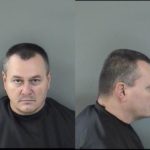UPDATE: Noon, July 8
VERO BEACH — During the morning session, Senior Judge James Midelis read about half the 45 counts aloud to the jury and then sent them on a lunch break until 1 p.m.
As soon as all the counts are read, the jury will be taken to a room to deliberate. Nearby, the jury will have all the paper evidence used in the trial at their disposal to refresh their memory about testimony given in the six-week trial. During the lunch break, prosecutors are researching case law that would permit Judge Midelis to allow the evidence to be given to the jury in manilla folders labeled with the count number, 1-45.
Defense Attorney Gregory Eisenmenger has repeatedly objected to this, claiming it amounts to the court making a comment on the charges and the evidence.
“I don’t want the case to go down in flames because the jury got the outside folders with information about the counts and the victims,” Judge Midelis said to prosecutors, sending them upstairs to find solid precedent.
A few weeks ago the court clerk began to organize the exhibits so they could be quickly located and so nothing got lost. Eisenmenger said Wednesday that he thought that filing system was for the clerk’s benefit only and not for presentation to the jury.
Disbarred attorney Ira C. Hatch is facing 45 felony charges of grand theft, racketeering and money laundering for allegedly stealing, mishandling and misappropriating an estimated $4 million from his firm Coastal Escrow Services and from his law firm of Hatch and Doty P.A. When Hatch closed Coastal Escrow on Sept 4. 2007 he notified clients that he was unable to refund the money they had on deposit there.
Hatch was arrested on Jan. 11, 2008, has been declared indigent and has been in the Indian River County Jail since his arrest.
* * *
6:55 p.m. July 7
VERO BEACH — Now that both the state and the defense have finished their closing statements, the fate of disbarred attorney Ira C. Hatch will be in the hands of the jury on Thursday.
Before breaking for a late lunch just after 1 p.m. Wednesday, the jury heard closing arguments from Assistant State Attorney Ryan Butler and Defense Attorney Gregory Eisenmenger. After lunch, Assistant State Attorney Lev Evans wrapped up for the state, offering rebuttal arguments to Eisenmenger’s two-hour presentation of all the reasons why the jury should find enough reasonable doubt to not convict his client.
While the state’s closing points focused on the victims who prosecutors say lost $4 million entrusted to Hatch and his firm and the documentary evidence to corroborate the transferring of that money to fund Hatch’s personal and business expenses over at least a three-year period, Eisenmenger’s counter-arguments targeted Hatch’s former employees, his former partner Kevin Doty and even the Realtors who brought much business Hatch’s way over the years.
Eisenmenger also claimed the state had cherry-picked victims and placed them together in groups “like a Chinese menu” to make up as many first-degree felony charges amounting to more than $100 as possible and to get up to the original 46 counts against Hatch (now 45 counts) instead of combining thefts into one large charge.
During his close, Eisenmenger recycled all the arguments he had presented to Senior Judge James Midelis over the past few days in motions for acquittal and motions to dismiss.
One argument was that the state was attempting to convict Hatch on individual theft using evidence of an “organized scheme to defraud” that should be charged as one count of fraud and another argument that the thefts were improperly grouped together to maximize the potential punishment for crimes that, in Eisenmenger’s opinion, were derived from a single pattern of illegal conduct — the transfer of depositors’ money from Coastal Escrow.
Judge Midelis had denied Eisenmenger’s requests to combine the majority of the charges into one large crime, but Eisenmenger took the argument to the jury anyway.
Evans in his rebuttal explained to the jury how the state compiled the charges against Hatch. He read the statutory guidelines which allow prosecutors to decide how to group charges and crimes.
“Folks, we broke this down, albeit in roughly 40 charges, they broke it down by Realtor. They broke it down into logical groups of victims,” Evans said. “The judge is going to instruct you to follow the law and to evaluate each one of the charges separately.”
Eisenmenger also characterized the testimony of former Coastal Escrow employees as suspicious and inferred that, because several of the bookkeepers and office personnel were counseled by the same attorney that they had colluded in placing all the blame for the meltdown of the business squarely with Hatch.
By reminding the jury that Hatch had been out of town often and that he had not personally signed many of the questionable checks the state was using as evidence, Eisenmenger tried to persuade jurors to suspect that someone else in the Coastal Escrow organization — not Hatch — could have been responsible for mishandling, stealing or losing millions of dollars in client deposits.
Evans also countered this, pointing out the consistency of the former employees’ testimony regarding Hatch’s hands-on management style and his admissions of guilt to those in his inner circle.
“You heard from multiple people that he (Hatch) was a micromanager, you saw evidence of that throughout this case,” Evans said.
“All the other employees said the same thing, that he was in charge, that he was a micro-manager,” he said. “At the end Hatch admitted fault, ‘I did this, not you, I’m to blame’,” Evans said. “At the end he says he had a $4 million deal that could fix everything.”
Evans read the numerous statements Hatch allegedly made to employees, clients, to former law partner Doty and to a mortgage broker from whom he was trying to get a hard-equity loan.
In an effort to reduce the amount of the money “stolen” from depositors from $4 million to $1 million, Eisenmenger brought up a theory that there were substantial payments made to Hatch and to Hatch and Doty P.A. in legitimate fees for services, in interest payments and in so-called 10-31 transfer fees gleaned from Hatch and his staff working on various real estate transactions and development projects.
In his rebuttal, Evans reminded jurors of the Escrow Addendum signed by Coastal Escrow depositors — a document they saw over and over again during testimony — and how it addressed fees.
“The defense continues to argue that there are all these management fees and that the state neglects to account for all these management fees,” Evans said. “Right in his own brochure it states that Coastal Escrow Services’ only business is to hold deposits and rents . . . those were his words and that was his promise to the people.”
“The deal was the interest or $35, it was written in all his contracts,” Evans said.
“In fact, it begs the question, if that was fees, where’s the peoples’ money?” he asked.
In closing, Evans asked the jurors not to go into deliberations and “think like lawyers” but to apply the standard of a reasonable person.
“The evidence is clear on this, from 2004 to 2007 Mr. Hatch, Ira Hatch directed millions of dollars to be transferred to his law firm for his benefit,” Evans said. “Use your common sense back there.”
Going back to his co-counsel Butler’s closing arguments pointing out how the losses — whether they were $1,000 or $100,000 — affected the lives and finances of the depositors, Evans reminded jurors that there were “hundreds of victims who thought they were putting their money into a safe harbor of an escrow firm.”
The jury returns at 9 a.m. to begin an estimated three-hour exercise of hearing the 99-page jury instruction read to them by Judge Midelis. Jurors will be given copies to follow along. They will then be sent into deliberations until a verdict can be reached on all 45 remaining charges.
Click here to read an earlier report of the closing arguments.






